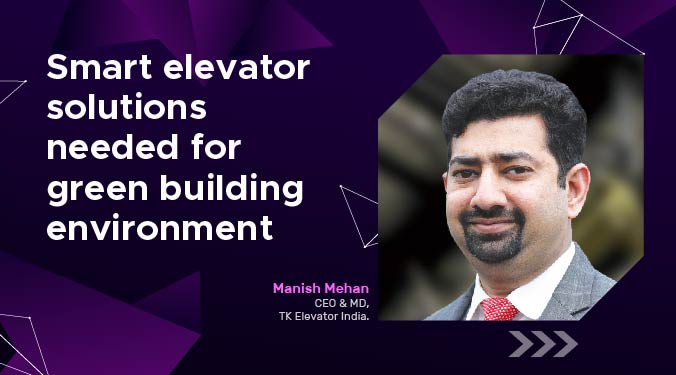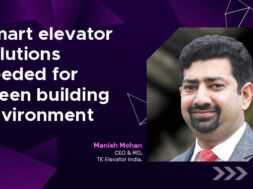Smart elevator solutions needed for green building environment

Manish Mehan, CEO & MD, TK Elevator India, speaks about how elevators play an essential role in sustainability and energy-saving building design. The concept of green building has always been associated with environment and sustainability related features such as green walls and solar panels, but it is way more than that.
Green building is one of the latest trends in the building and construction industry, which aims to reduce energy consumption through sustainable and energy-saving building design and using energy-efficient equipment. With growing urbanisation and the vertical development of cities, sustainable living has become extremely important.
Energy consumption is high in cities, with the significant source of consumption being buildings, manufacturing units, and transport. In the wake of global warming and pressing concerns about energy consumption, green building is becoming increasingly relevant to urban lives.
What are the challenges in fostering green buildings in the country?
A popular view against green buildings involves higher operation and maintenance costs than conventional buildings. Instead, the truth is by optimising critical systems such as lighting, air conditioning, electrical and vertical transportation, green buildings can, over a longer term, help reduce energy consumption and operation costs thanks to their higher operational efficiency.
Locally, the popularity of green buildings could be improved somewhat by funds and budget constraints of owners and developers, limited awareness of operation and maintenance requirements, and, most importantly, the environmental and financial benefits green buildings can offer in the longer term.

How can next-generation elevator solutions contribute to developing green building concepts in the country?
Elevators allow cities to expand upwards instead of outwards, allowing us to reduce urban sprawl effectively and associated negative impacts of traffic congestion, pollution and other key issues that concern many countries in Asia Pacific. Modern buildings are responsible for 40 percent of overall energy consumption, and around 10
percent of the building’s electricity is consumed by traditional elevators. But this can be overcome with smarter and newer elevator technologies.
Using TK Elevator’s revolutionary TWIN elevator system as an example, with two elevators operating independently in one shaft, the TWIN offers the benefits of significantly increasing system capacity without needing extra elevator shafts. The most significant advantage of our TWIN is its ability to park one of the two cars while the other stays in operation. When low passenger volumes, very little energy is consumed by nonmoving cars. Additionally, the TWIN can be equipped with energy recovery devices that feed about 30 percent of energy into the building’s power grid.
How are digital and sustainable mobility solutions becoming the major game changer?
Mobility solutions play a pivotal role in building a sustainable tomorrow. And TKE’s solution for the future is MULTI, which allows the operation of multiple cabins in both horizontal and vertical directions. It frees tall building design from the constraints imposed by traditional elevators. As the world’s first rope-free elevator system, MULTI gives architects the power to reshape our cities entirely and has the potential to connect floors and buildings and cities as an eco-friendlier transportation means.
The focus of our innovation is also on using the latest technologies to drive energy efficiency and minimise the overall energy consumption of the building. In addition, all our elevators can be equipped with MAX, which provides the benefits of data analytics to facilitate predictive maintenance services. MAX is a game-changing predictive and pre-emptive maintenance solution that extends remote monitoring capabilities to dramatically increase the current availability levels of existing and new elevators. Using Microsoft Azure Internet of Things (IoT) technology, MAX predicts maintenance issues before they occur and empowers elevator engineers by flagging the need to replace components and systems before the end of their lifecycle. Our AGILE Destination Control (DSC), also improves system efficiency and passenger experience by effectively shortening wait and travel times.
Compared to conventional elevator control systems, the AGILE DSC increases passenger handling capacity by up to 30 percent, minimises passengers’ travel times to their destination and reduces crowding in lift lobbies. DSC also allows for much more flexibility in elevator grouping, lift core layouts and overall building design.
Why should one opt for digital elevator technology in the building?
• Reduced energy consumption:
By optimising key systems such as lighting, air-conditioning, electrical and vertical transportation, green buildings can, over a longer term, help reduce energy consumption and operation costs thanks to their higher operational efficiency.
• Reduce negative impacts of urban sprawl:
Elevators allow cities to expand upwards instead of outwards, allowing us to effectively reduce urban sprawl and associated negative impacts of traffic congestion, pollution and other key issues that are a concern for many countries in Asia Pacific.
• Versatile elevator deployment:
TK Elevator’s next-generation elevator TWIN has the advantages of flexible zoning by operating the two cars independently, lighter in total weight, and the added flexibility to park one of the cars during non-peak hours to save energy; this is very important for modern green buildings
• Improves system efficiency and the passenger experience:
Compared to conventional elevator control systems, the AGILE DSC increases passenger handling capacity by up to 30 percent, minimises passengers’ travel times to their destination and reduces crowding in lift lobbies. DSC also allows for much more flexibility in elevator grouping, lift core layouts and overall building design, making it the ideal elevator control solution for modern green buildings.

What are the major applications?
Green building reduces the environmental impact of buildings by optimising the use of energy, light and other resources to reduce consumption and minimise carbon footprint. Next generation elevator solutions such as TKE’s TWIN and MULTI, used in newlybuilt skyscrapers and high-rises, can reduce urban sprawl and its associated impacts. Still, older buildings can also be turned into more sustainable or “greener” ones by modernising their vertical mobility system.
Digital solutions such as TKE’s MAX and AGILE DSC can also bring operation and energy efficiency benefits to older buildings using modernisation. In a nutshell, the concept of green building applies not only to new state-of-the-art high-rises and newly developed urban areas but to all kinds of buildings and infrastructures, thereby extending the benefits of reduced environmental impact and enhancing the health and well-being of occupants to people dwelling in less developed and older communities as well.
for more info visit : https://www.tkelevator.com/global-en/
Cookie Consent
We use cookies to personalize your experience. By continuing to visit this website you agree to our Terms & Conditions, Privacy Policy and Cookie Policy.










